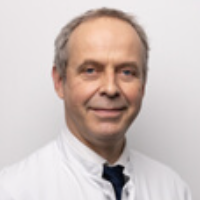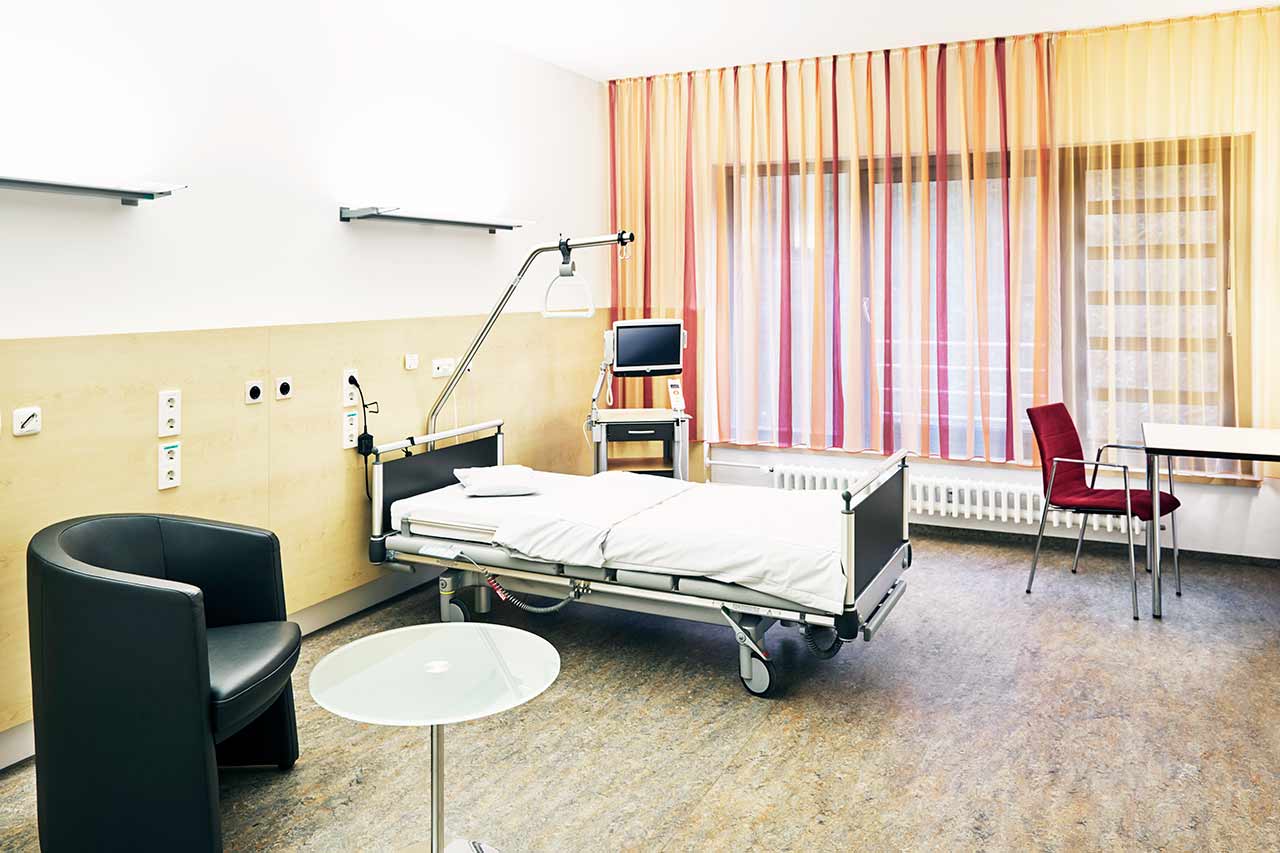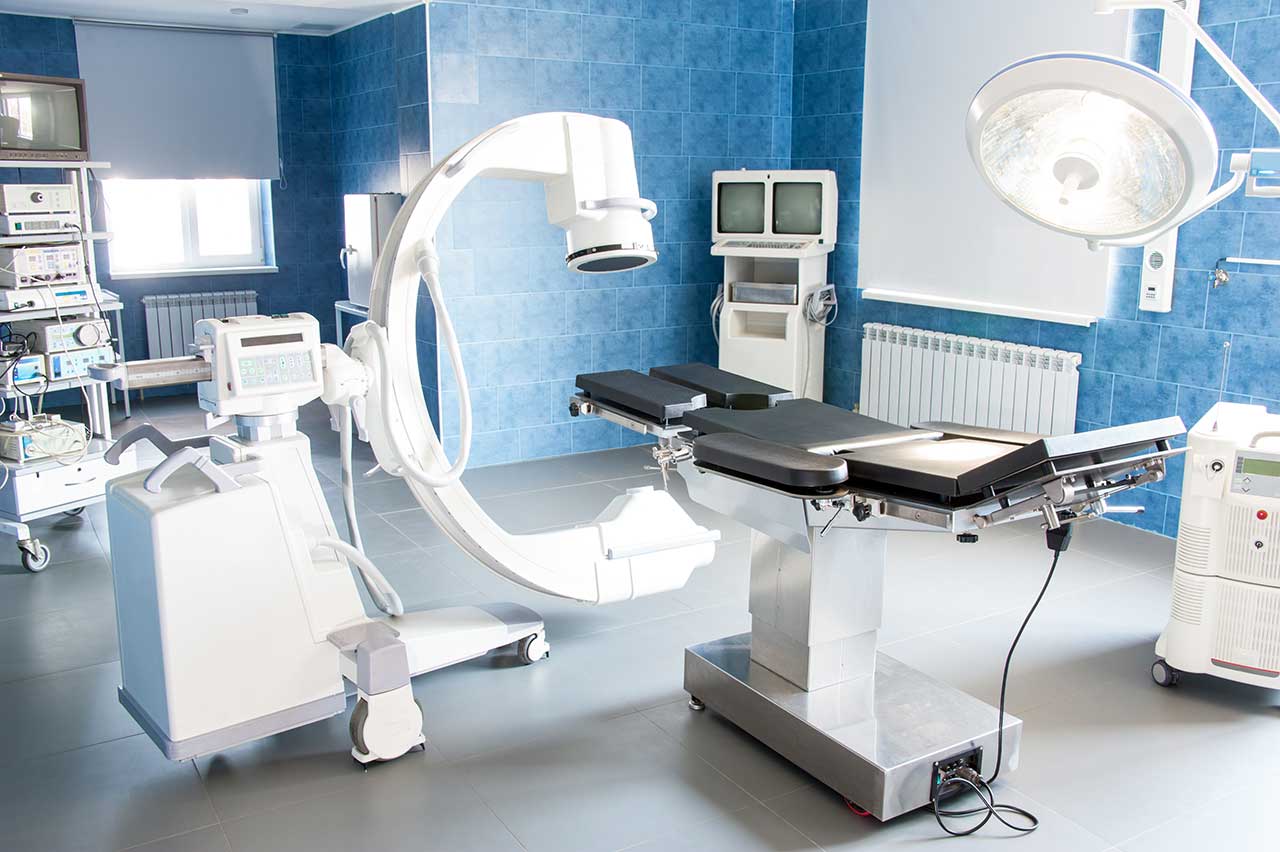
The program includes:
- Initial presentation in the clinic
- clinical history taking
- review of medical records
- physical examination
- laboratory tests:
- complete blood count
- general urine analysis
- biochemical analysis of blood
- inflammation indicators (CRP, ESR)
- TSH-basal, fT3, fT4
- indicators of blood coagulation
- CT planning of radiation therapy
- full course of conventional radiation therapy
- symptomatic treatment
- cost of essential medicines and materials
- nursing services
- control examinations
- consultations of related specialists
How program is carried out
During the first visit, the doctor will conduct a clinical examination and go through the results of previous laboratory tests and instrumental examinations. After that, you will undergo an additional examination, including complete blood count, laboratory assessment of liver and kidney function. Based on the received results, the physician will conduct radiotherapy planning with the help of CT or MRI, make the permanent tattoo marks on the skin and conduct CT simulation in order to assess the accuracy of the rays and the radiation dose. If necessary, related medical specialists will be involved in the elaboration of a treatment regimen (tumor board).
Radiation therapy is carried out as the day hospital procedure, without mandatory admission to the hospital. At each visit, the physician will assess your general condition and the marks on the skin. After that, you will be placed in a shielded radiation therapy room, on a special table.
Each radiation therapy session lasts less than half an hour (including preparation). All this time, doctors and nurses are monitoring your condition, you can communicate with them through a loudspeaker. The procedure is completely painless. Depending on the planned course of treatment, you will visit the hospital from 1 to 3-5 times a week.
After the completion of the radiation therapy course, you will undergo control examinations aimed at assessing your condition and efficacy of treatment. After that you will receive the medical report with detailed recommendations regarding further follow-up and treatment. In the future, you will be able to have a distant consultation with your attending physician and schedule the next course of treatment, if necessary.
Required documents
- Medical records
- MRI/CT scan (if available)
Service
You may also book:
 BookingHealth Price from:
BookingHealth Price from:
About the department
The Department of Radiation Therapy at the Marien Hospital Duesseldorf offers the full range of modern types of irradiation for the treatment of malignant diseases of various localization. Along with surgical treatment and chemotherapy, radiation therapy is one of the most effective methods of treating oncology. The department's specialists also successfully carry out chemoradiotherapy. Regular tumor boards are held in interdisciplinary cooperation with the specialists from related medical fields, during which the most appropriate time for radiation therapy (before or after surgery), as well as its combination with other treatments (for example, chemotherapy) is selected. The medical facility keeps pace with innovations, and therefore it uses advanced irradiation methods that targetedly affect malignant cells and practically do not affect healthy tissues. In addition, the department deals with the treatment of benign diseases such as arthrosis, tennis elbow, heel spurs and others. Doctors accurately plan the dose of radiation and the duration of the course of therapy in order to achieve the best result. The Head Physician of the department is Prof. Dr. med. Karl Axel Hartmann.
Before starting the course of radiation therapy, the department's doctors carry out 3D planning of the upcoming treatment using the cutting-edge CT scanner. Such an approach ensures maximum accuracy and safety of irradiation. The preparatory stage takes about 2 weeks. The course of radiation therapy is usually carried out for 5-7 weeks, at certain intervals between procedures. The irradiation session lasts only 2-5 minutes, but additional time is also required for the correct positioning of the patient. The treatment regimen is developed for each patient individually, taking into account the specific diagnosis and stage of cancer. During the therapeutic process, the doctor can adjust the treatment regimen, if necessary.
One of the important areas of the department's specialization is brachytherapy for prostate cancer treatment. Brachytherapy is a highly effective method of contact radiation therapy. This type of irradiation involves the introduction of radioactive "seeds'' directly into the pathological focus. The manipulation is performed under general anesthesia, using special needles. When placing radioactive "seeds" inside the prostate gland, the attending physician is guided by previously made CT scans. Depending on the severity of the clinical case, doctors can perform either low-dose or high-dose brachytherapy. The difference lies in the fact that high-dose brachytherapy uses a radioactive source of higher power. In addition, the high-dose form of irradiation is often combined with external beam radiation therapy, which enhances its effect. When dealing with prostate cancer treatment, brachytherapy is usually performed on an outpatient basis. In rare cases, it may be necessary to stay in a hospital under the supervision of doctors for 1-2 days. Brachytherapy demonstrates high efficiency. In addition, the risk of developing severe complications such as erectile dysfunction and urinary incontinence is significantly lower as compared to other therapeutic procedures.
The department offers another modern type of irradiation – intensity-modulated radiation therapy (IMRT). The technique allows the doctors to adjust the radiation dose in different areas of the radiation field, as well as accurately adjust the delivery of radiation to each individual point of the tumor. The main advantage of this type of radiation therapy is the high-precision irradiation of the oncological focus and the maximum protection of the adjacent tissues and organs. In addition, intensity-modulated radiation therapy can be used repeatedly to treat local cancer recurrences. IMRT is of particular value in the treatment of head and neck malignant tumors, prostate cancer, soft tissue sarcomas and other tumors.
The department also carries out afterloading therapy, which is a method of short-term high-dose irradiation. As a rule, the technique is used in combination with a course of external beam radiation therapy for the treatment of locally advanced cancer.
A special focus of the work of the department's doctors is radiation therapy for benign diseases: tennis elbow, heel spurs, inflammation of the Achilles tendon, shoulder-hand syndrome, arthrosis and other pathologies. In such cases, radiation therapy can effectively eliminate pain, especially chronic pain in the joints and tendons. The painful area is usually irradiated several times a week, while the session lasts about 30 seconds. The procedure is absolutely painless. Due to the low dose of radiation, side effects are extremely rare, which is a great benefit.
The department specializes in radiation therapy for the following benign and malignant diseases:
- Malignant pathologies
- Brain tumors (for example, glioblastomas)
- Head and neck tumors
- Esophageal cancer
- Stomach cancer
- Colorectal cancer
- Lung cancer
- Cervical cancer
- Bladder cancer
- Soft tissue tumors
- Benign pathologies
- Tennis elbow
- Heel spurs
- Inflammation of the Achilles tendon
- Steinbrocker shoulder-hand syndrome
- Osteoarthritis of various localization
- Flexion and extensor contracture of fingers and toes
- Soft tissue calcification (including prevention before surgery or prevention after injury)
- Prevention of gynecomastia in men (for example, before hormone therapy for prostate cancer)
- Abnormal scarring
- Penile curvature
- Other diseases
The department's main therapeutic options include:
- Intensity-modulated radiation therapy
- Brachytherapy for prostate cancer
- Concurrent chemoradiotherapy
- Afterloading therapy
- Other therapies
Curriculum vitae
University Education
- 1982 - 1983 Study of Physics and Evangelical Theology at the University of Marburg.
- 1983 - 1984 Civil service at the University Hospital Marburg.
- 1984 - 1990 Study of Human Medicine at the Philipps University of Marburg.
- 1990 - 1991 Continued studying Human Medicine in the RWTH Aachen and at the Queen’s Medical Center, University of Nottingham, Great Britain.
- 13.05.1991 3rd State Medical Examination.
- 05.11.1992 Doctoral thesis defense at the Philipps University of Marburg (magna cum laude).
- 03.12.1992 Admission to medical practice.
Medical and Scientific Activities
- 1991 - 1996 Department of Radiation Therapy at the University Hospital Duesseldorf.
- 12.1996 Examination for board certification.
- 1996 - 1998 Scholarship of the Dr. Mildred Scheel Foundation, a study on tumor oxygenation in the Academic Medical Center Amsterdam.
- 05.1998 Senior Physician, Department of Radiation Therapy at the University Hospital Duesseldorf.
- 01.07.1999 Habilitation, preclinical research on the application of 250 kV x-rays and hyperoxygenation in patients with rhabdomyosarcoma R1H.
- 2000 - 2002 Managing Senior Physician, University Hospital Duesseldorf.
- 02.09.2002 Head Physician of the Department of Radiation Therapy at the Marien Hospital Duesseldorf.
- 14.12.2004 Extraordinary Professorship at the Heinrich Heine University Duesseldorf.
- 2004 - 2008 Board Member of the German Society for Radiation Oncology (DEGRO).
- Since January 2006 Medical Director.
Memberships in Professional Societies and Teaching Activities
- European Society for Therapeutic Radiology and Oncology (ESTRO).
- American Society for Therapeutic Radiology and Oncology (ASTRO).
- German Society of Radiation Oncology (DEGRO).
- Professional Association of German Radiation Therapists.
- German Cancer Society.
- Member of the Physician Selection Commission (RöV and StrlSchV), Medical Association of North Rhine-Westphalia.
- Member of the Ethics Committee, Medical Association of North Rhine-Westphalia.
- Teaching activities at the University Hospital Duesseldorf.
Photo of the doctor: (c) Marien Hospital Düsseldorf
About hospital
The Marien Hospital Duesseldorf is a modern medical facility in the very center of Duesseldorf and a recognized Research Center. The foundation stone of the hospital was laid back in 1864 with the support of the Catholic Church. The Christian principles of helping and supporting patients have not changed at all over the years, but the level of medical care has become fundamentally different: a small hospital has been transformed into a multidisciplinary medical center with 11 internal departments, institutes and 7 interdisciplinary centers. Thus, patients can receive a comprehensive diagnostic examination and treatment under one roof. The medical facility is an academic hospital, so patients have access to innovative achievements in the field of modern medicine and receive the most effective treatment.
The hospital has 437 beds for inpatient treatment. It provides first-class medical services to 63,000 patients every year. The doctors and nursing staff of the hospital strive to provide each patient with customized treatment, taking into account their wishes and needs. In addition to providing top-class medical care, the specialists pay attention to the humane attitude towards patients and their life situation. Doctors devote enough time to personal communication with patients and support them in every possible way on their path to recovery.
The team of the hospital consists of competent doctors who are the best professionals in their medical field. They all work in interdisciplinary cooperation. In their clinical practice, doctors use state-of-the-art equipment, the very latest technologies, as well as innovative treatment methods, which in combination allows achieving optimal treatment outcomes.
Photo: (с) depositphotos
Accommodation in hospital
Patients rooms
The patients of the Marien Hospital Duesseldorf live in comfortable patient rooms equipped with everything necessary. The room furnishing includes a comfortable bed with an orthopedic mattress, a bedside table, a wardrobe, a table, chairs, and a TV. The rooms are designed in light colors so that patients feel comfortable here. Each patient room also has an ensuite bathroom with shower and toilet.
Meals and Menus
The patients of the hospital are offered a healthy and balanced three meals a day: buffet breakfast, lunch and dinner. The menu also includes dietary and vegetarian dishes.
If for some reason you do not eat all the foods, you will be offered an individual menu. Please inform the medical staff about your food preferences prior to treatment.
Further details
Standard rooms include:
Religion
Religious services are available upon request.
Accompanying person
Your accompanying person may stay with you in your patient room or at the hotel of your choice during the inpatient program.
Hotel
You may stay at the hotel of your choice during the outpatient program. Our managers will support you for selecting the best option.





